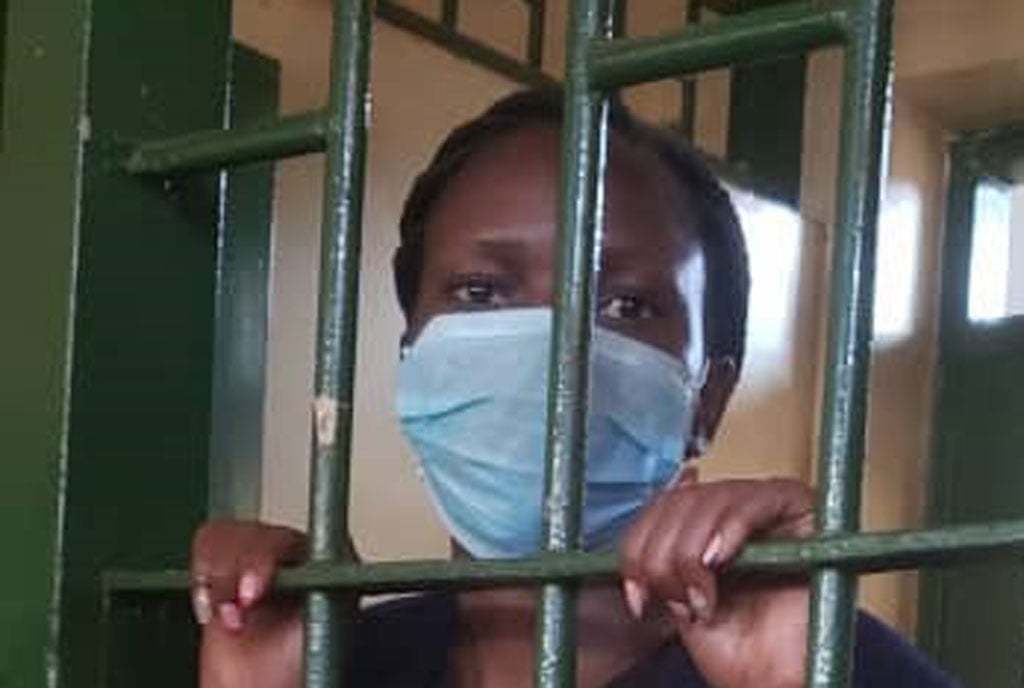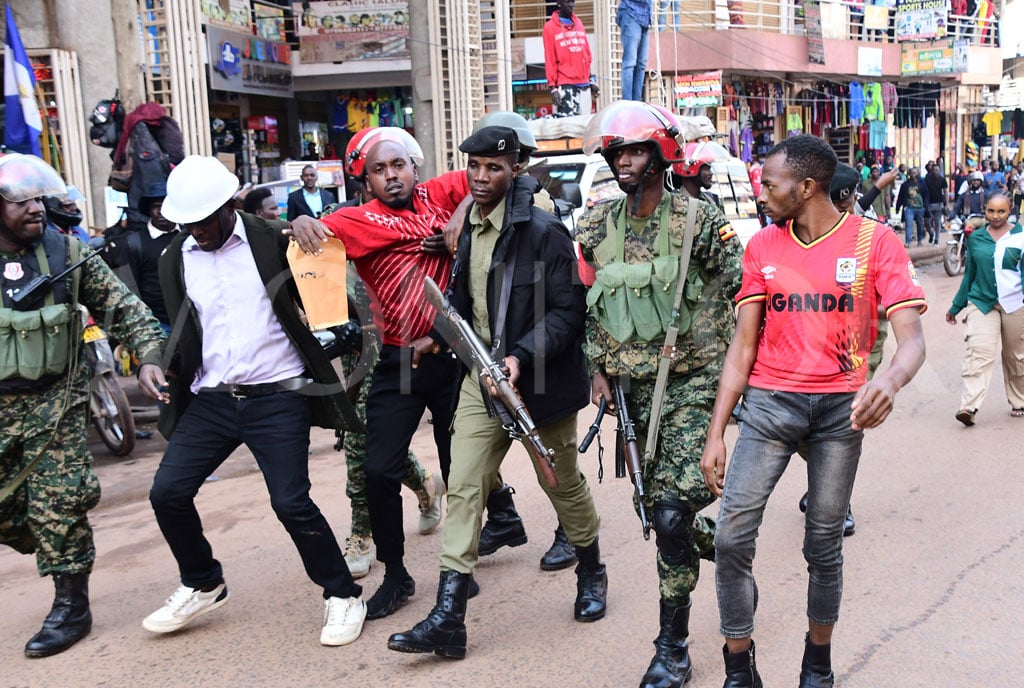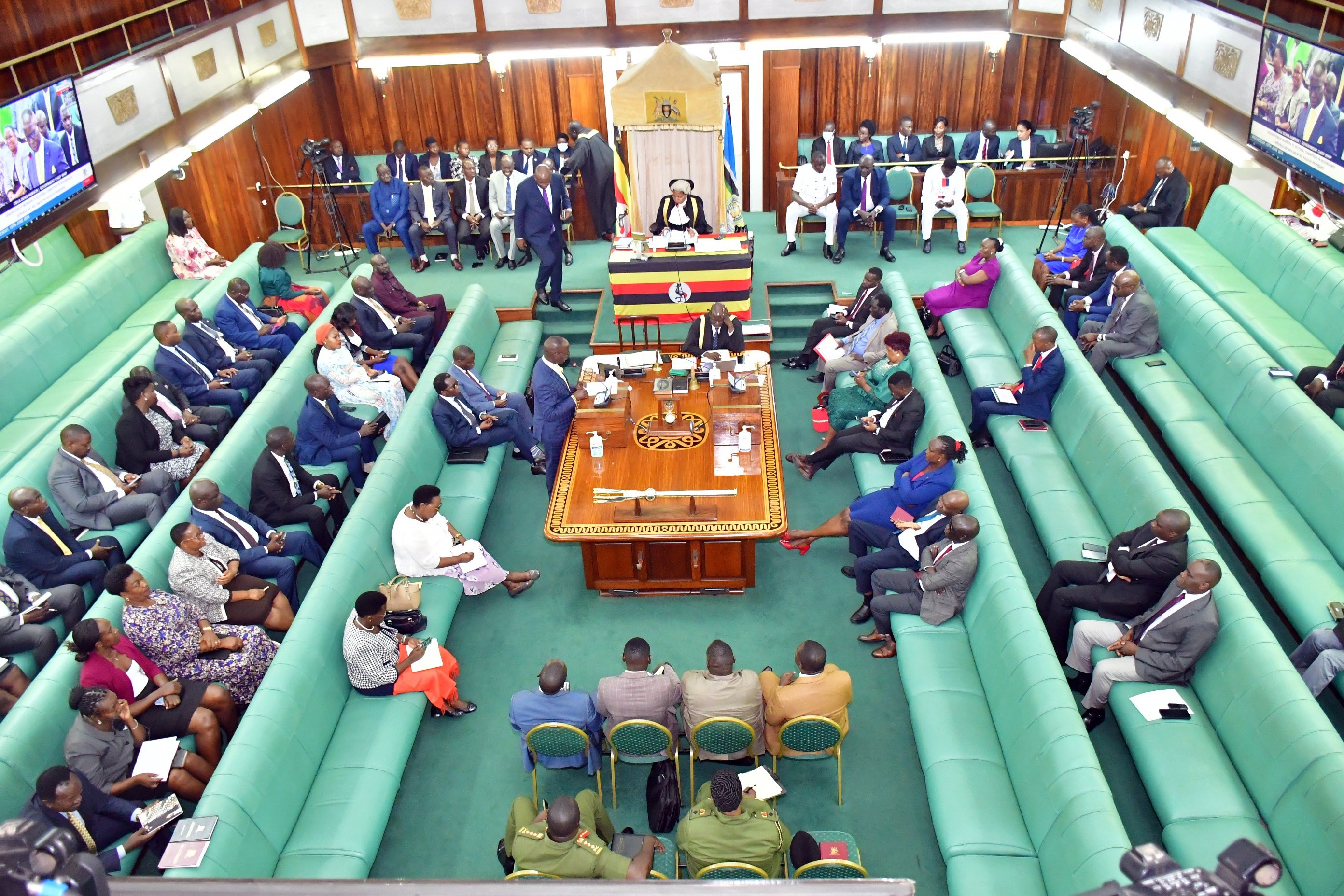
Norah Kobusingye (wearing a face mask) during the July 23 March to Parliament demonstrations. On the day of the demonstrations, the 25-year-old said she had a cold with the running flu and that is why she wore a mask. Kobusingye says she was not hiding her face as some people thought. PHOTO/ISAAC KASAMANI.
Norah Kobusingye, 25, is an embodiment of calmness and is always cool-headed even under pressure.
So, when she told family and friends that she was going to join the July 23 March to Parliament to protest alleged corruption and excessive spending by Parliament, they all thought she was joking.
But on the D-day, when images and videos began making the rounds on mainstream and social media, showing her and several other youths attempting to march to Parliament, it then dawned on the parents that, indeed, Kobusingye had meant her words.
The 25-year-old was arrested alongside seven other demonstrators only a few metres off Parliament’s South Gate. The youthful protesters were all meeting for the first time on that day.
“I had initially planned to do a solo protest but after meeting other colleagues in the field, we joined up,” she says.
Kobusingye told Daily Monitor in an August 4 interview that she has in recent years been frustrated by the current state of affairs in the country, forcing her to participate in the July 23 demo.
“I run a salon and feel the pinch of high taxes. We are struggling to stay afloat in business and yet we are hearing all kinds of stories of leaders misusing taxpayers’ money, including our very own Members of Parliament who are supposed to be fighting for the common man. This inequality pushed me to join the walk,” she says.
The youth staged the march to Parliament on July 23 and July 25 to protest alleged corruption and excessive spending by the lawmakers at the expense of the taxpayers.
After evading police and almost accessing the Parliament’s South Gate, and chanting against the Speaker and Parliament, the police swooped on the group and bundled them into a police van with compartment to hold detainees.
Amid the scuffle, shoving and kicking, one particular tall policeman, Kobusingye says, grabbed her by the neck, almost choking her. She recalls him saying: “You are going to die. Do you know where you are going?”
Kobusingye says the statement sent cold shivers down her spine. She says the policeman only relaxed his iron-grip on her neck when other officers told him to let go.
The group was then driven to Central Police Station (CPS) Kampala where Kobusingye, along with other protesters, agreed to make a statement. From there, it was a quick stop at Buganda Road Magistrates’ Court where the team was charged with being a common nuisance and was whisked off to Luzira Prison until July 31.
Miseries in Luzira
At Luzira, the males and females made their way to their respective sections, but every newcomer had to be thoroughly body-checked.
“I had to strip naked before a female guard. I tried to explain to her that I could not remove the knickers since I was in my periods and wearing a sanitary pad. She did not want to hear anything.
“She ordered me to pull down the knickers and squat, and while down, I was also told to cough hard. I was allowed to put back my knickers on with the pad still intact after the search,” she recounts.
After the process ended, they were given yellow uniforms to wear, their details taken before being ushered to a crowded room that was packed with other inmates.
For the next week, the new inmates had to follow a strict prison routine. Wake up by 5am, rush for a quick bath in crowded and depilated washrooms that served both as toilets and bathrooms, pray, have porridge without sugar for breakfast at 7am, eat lunch by 11am and supper by 2pm. The main course invariably is beans and posho.
From time to time, they also have to run back to their rooms to be head-counted.
Their free time is spent either praying or simply doing nothing.

Norah Kobusingye is seen under detention following her arrest over the July 23, 2025 March to Parliament anti-corruption protests. PHOTO/ISAAC KASAMANI.
Necessities, including sanitary pads, which are available for sale at the prison, can be bought using one’s account number [it should be money probably deposited by loved ones, including family members and friends who visit].
Besides the security guards, other senior inmates nick-named Katikkiros also oversee the prisoners.
“The Katikkiros have power, like prefects in schools. They can either beat or shout at you,” Kobusingye says.
Before bedtime, the Katikkiros may choose to switch on television in the evening hours, at about 7pm, so that the inmates can watch news bulletins for about 30 minutes before going to bed.
Among the visitors Kobusingye received was her worried father who was not shy to ask why his daughter got into the prison mess.
“He asked me a lot of questions and even joked that they would not let me out and that I was going to die in there,” she says.
The remarks got to Kobusingye’s head as she contemplated her actions.
She questioned whether she had done the right thing.
“Prison is hell. The conditions are so poor and people bully you, a lot. People there are soulless and don’t care whether you live or die. I don’t want to go back there,” she says. Kobusingye says she will think twice again before ever participating in a public protest.
Respite
Lawyers offering pro bono [free] services that visited Kobusingye and other protesters assured them they would be granted bail come July 31.
Indeed, Kobusingye and the other protesters were let out and will be returning to court on September 5 to continue hearing their respective cases. She hopes that on that day, their files are closed and fully regain their freedom.
Prisons authorities react
Mr Frank Baine, the spokesperson of Uganda Prisons Service, said everyone should avoid going to Luzira.
“On prisoners being stripped and checked is a [must] process. How would we know that they are either female or male without that kind of search?
“On the allegations that the conditions in prisons are inhumane, what do they expect? Someone with an impression of a hotel in mind will always be shocked to be in Luzira because this is a prison, and the conditions are very different from those of the outside world.
“Of course, they will complain about congestion, but it is everywhere, including in hospitals. We operate within the means of the budget we have. On the claims of being bullied by fellow inmates and guards, when you become uncooperative, our mandate is to discipline and put you back in order.
“People call us [security personnel] murderers, soulless, which I [find] ironic because the prisoners themselves are the ones who have committed different crimes and not us. We look after defilers, murderers, terrorists, and robbers and then you call us bad? I caution every Ugandan to do everything possible to avoid coming here.”








